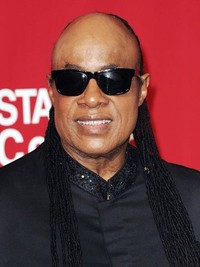Stevie Wonder

An American musical genius, Stevie Wonder emerged from the Motown hit factory to reach even higher artistic ground. Born Stevland Judkins (later Morris) in Saginaw, Michigan, he was blinded as a result of his premature birth. As a child he learned to play piano, harmonica and drums, and passed a 1961 Motown audition at age eleven; producer Clarence Paul dubbed him Little Stevie Wonder. His first hit "Fingertips, Part 2" came a year later; it was a mostly-instrumental, near-novelty track that featured his harmonica. This however was just the start to a run of hits through the '60s, ranging from the pure exuberance of "Uptight (Everything's Alright)" to the first of many popular love ballads, "My Cherie Amour." His tenth and eleventh Top Ten hits-- the proto-funk "Signed, Sealed, Delivered" and the topical, gospel-ish "Heaven Help Us All" both came in 1970, the year he turned twenty. He began producing himself on later '60s releases, and as the '70s dawned he began to break away from the Motown hit formula. A pair of transitional albums, Where I'm Coming From (1971) and Music of My Mind (1972) both explored headier territory; both were praised by critics and musicians though only there was only one major hit (the former album's "If You Really Love Me") between them. His experiments bore fruit with late 1972's Talking Book. By now he was heavily into synthesizers and studio wizardry, playing most of the instruments himself, but his melodic gifts were also back in the forefront. The album spawned two very different classic singles in "You Are the Sunshine of My Life," an instant romantic standard, and "Superstition," a rocker originally written for Jeff Beck (Wonder's version replaced guitars with the novel sound of the Clavinet). He effectively ruled the pop world for the remainder of the '70s, and his social conscience (shown on the hits "You Haven't Done Nothing," about Richard Nixon, and "Living for the City") made him a much-admired figure. His standing in the industry was so lofty that when Paul Simon won the Album of the Year Grammy Award in early 1976, he thanked Wonder for not releasing an album that year. Yet the end of that year brought Wonder's Songs in the Key of Life, a double album (plus bonus EP) that was a career peak for its musical ambitions and popularity. Among its hits was "Sir Duke", easily the only '70s chart-topper to reference Ellington. Wonder never quite matched his '70s-'80s creative streak. He ended the '70s with another double album, Journey Through the Secret Life of Plants, that was far more experimental (and keyed to a never-released movie) and a relative flop. The hit singles continued, though they weren't always as innovative as before (1984's "I Just Called to Say I Love You" was technically his best-selling single). A harder funk track, "Skeletons," became his last hit in 1987. He appeared at many notable events including Michael Jackson's and Aretha Franklin's funerals; and continued to perform his classic-era material (a 2014 tour featured Songs in the Key of Life in its entirety). He maintained his iconic status despite a lack of new material.